- Home
- T. Kingfisher
Paladin's Strength
Paladin's Strength Read online
Praise for T. Kingfisher
“Dive in...if you are looking to be charmed and delighted.”
Locus
“…[A] knack for creating colorful, instantly memorable characters, and inhuman creatures capable of inspiring awe and wonder.”
NPR Books
"The writing. It is superb. T. Kingfisher, where have you been all my life?"
The Book Smugglers
Paladin’s Strength
Book Two of the Saint of Steel
T. Kingfisher
Copyright © 2021 by T. Kingfisher
Published by Red Wombat Studio
All rights reserved.
No part of this book may be reproduced in any form or by any electronic or mechanical means, including information storage and retrieval systems, without written permission from the author, except for the use of brief quotations in a book review.
Created with Vellum
Still for Kevin, but moreso
Contents
Chapter 1
Chapter 2
Chapter 3
Chapter 4
Chapter 5
Chapter 6
Chapter 7
Chapter 8
Chapter 9
Chapter 10
Chapter 11
Chapter 12
Chapter 13
Chapter 14
Chapter 15
Chapter 16
Chapter 17
Chapter 18
Chapter 19
Chapter 20
Chapter 21
Chapter 22
Chapter 23
Chapter 24
Chapter 25
Chapter 26
Chapter 27
Chapter 28
Chapter 29
Chapter 30
Chapter 31
Chapter 32
Chapter 33
Chapter 34
Chapter 35
Chapter 36
Chapter 37
Chapter 38
Chapter 39
Chapter 40
Chapter 41
Chapter 42
Chapter 43
Chapter 44
Chapter 45
Chapter 46
Chapter 47
Chapter 48
Chapter 49
Chapter 50
Chapter 51
Acknowledgments
About the Author
Also by T. Kingfisher
One
Clara stood outside a stranger’s tent, holding a naked sword in her hands.
She was not particularly afraid. She was aware that fear would be appropriate, but she had shoved it all down into the vague space inside her chest, where it could not interfere. It was the saint’s will that she be where she was, and if that meant that she was going to stand here with a group of armed men a few feet behind her, waiting for a stranger to come out of his tent, then so be it. She might have preferred to be somewhere else, but the saint had put her here.
Let us hope, therefore, that it not be the saint’s will that I be cut down by the owner of this tent before he realizes what is going on.
The tent was large but collapsible, and made of oiled cloth rather than leather. It had been pegged down somewhat loosely and no attempt had been made to secure it against weather.
Temporary lodging only. They plan to move on before the weather changes.
This struck her as a good sign.
There was a tent flap, but her hands were full of steel. Clara cleared her throat.
There were four tents in all, a wagon, and a trio of picketed mules. She knew that the occupants of the others had already seen her and the armed men behind her.
“Boss…” drawled a voice from near one of the other tents, “they’re back. And there’s a woman out front with a sword.”
“God’s balls,” said a voice from inside the tent, presumably “Boss.” “Not another one!”
Clara rather suspected that they didn’t expect her to speak their language, which was Harshek, from the south and west. There was no point in letting her future captors know how much she understood just yet, so she kept her face studiedly neutral.
“This one doesn’t look like she plans to cut you just yet, Boss.”
“Well, that’s something.”
She heard the sounds of a man moving inside the tent, the scrape of metal on metal as he drew a sword from a sheath.
Well, if I am going to die today, at least the weather is nice... The sky was clear blue, with only a few puffy white clouds. The air smelled of the pine trees that grew close around the road.
Clara had been very close to death twice in the last month. Once the air had smelled of burning buildings, and once of sickness and unwashed bodies. Pine was certainly preferable.
Oddly, the tent itself had a faint odor of whiskey. Clara wondered how much the inhabitant drank, if the outside smelled of it. A bold black sigil had been embroidered on the tent flap. A name? A rank? A ward against whatever misfortune might befall tents? And what might those be? Windstorms or stampedes or avalanches? This seemed like a great deal to place on one ward.
Behind her, the leader of the Arral war band shouted, “We bring the payment of victory!”
The man addressed as Boss threw back the flap and stepped outside. There was a sword in his hand, much finer than the one she carried.
He was tall and heavy-boned, taller than any of the men behind her, and he almost certainly expected to look down to meet a woman’s eyes. That Clara had only to lift her chin a fraction to meet his clearly surprised him.
His gaze dropped very quickly, however, to the sword.
She dropped down onto her heels and held the blade out on the flats of her palms. She tried to make herself look as nonthreatening as possible, head bowed, while she studied him through her eyelashes.
His face was dark and seamed with scars, his hair black and fiercely curly, shot with gray at the temples. There were fine lines at the corners of his eyes, paler than the surrounding skin. Clara had seen lines like that in men who spent a great deal of time in the sun. It made him look older than he probably was, and he already did not look young. Nearly forty, perhaps.
He looked past her to the band of men standing twenty yards away. “Now what do they want?”
“They’re not looking all that friendly, Boss!”
“Thank you, Galen. I could not possibly have figured that out for myself.”
“It’s what I do, Boss.”
Clara said in War-tongue, very quietly, “Take the sword.”
His eyes dropped down to hers. “What?”
“Please keep your voice down. I should not be talking. And take the sword. It belongs to the man you killed.”
“I don’t—” He swallowed, then lowered his voice to a fierce whisper. “I don’t want his damn sword! I didn’t want to kill him at all!”
Clara sighed. “If you don’t take the sword, you are saying that his house still owes you. If you accept the sword, then you accept the price his house has paid and this will be done.”
The men behind her were growing restless. Clara could hear them murmuring to each other.
“Why does his house owe me anything?”
“Because he claimed offense and challenged you. The gods clearly found against him.”
“I would have just apologized if he’d explained!”
Clara prayed to St. Ursa for patience. “Take the sword. Please.”
“Or what?”
“Or his uncles will have to get involved. That’s them standing behind me.”
“Saint’s balls.” The man rubbed his face. He was wearing worn leather gauntlets, only a shade darker than his skin. “All right.”
He reached down and picked th
e sword up by the hilt. A sigh went through the watching men.
“Now what?”
“Now hold it up. Sideways, not point up.”
He did so. “Ah…They’re backing up.”
“Good.”
His eyes flicked down to her again. “What the hell is going on?”
“A very complex bit of social theatre. Put your hand on my shoulder.” She was ordering him as if he were one of the novices, poor man. Well, there was no help for it. More lives than hers were at stake. “It’s for the best,” she said. “Truly.”
He obeyed. A man used to taking orders as well as giving them. That was interesting. His expression was really quite indescribable. Frustration, she thought, and under that, a fine sense of the absurdity of it all.
“What are they doing now?” she asked, keeping her eyes on his face.
“They seem to be leaving.”
“Now would be a good time to go back in the tent, then.”
“There’s one left.”
“Yes, I imagine so. He is watching to make sure that it is concluded.”
He glanced warily back at the man in the road, then down at her. She raised her eyebrows.
“All right. Err…thank you.”
She nodded.
He stepped back into the tent. Clara shuffled forward on her knees.
“Annnnd you’re coming in. All right. Ah…well, then.”
“I will explain inside,” she promised.
“Oh, good.”
She bowed her head even lower, partly for the benefit of the watcher and partly to hide her smile.
Once she was inside, the man let down the tent flap behind them. In Harshek he called, “Galen, I don’t know what’s going on here, but hopefully this woman can explain.”
“What if she kills you, Boss?” called Galen.
“Then either avenge me or put her in charge. Your choice.”
Clara was glad that she had experience keeping her face schooled to immobility or she might have given away her mastery of the language right there.
The inside of the tent was dim, lit by the open smokehole at the top. There was no fire burning, though, only a small brazier of coals, just enough to warm an equally small kettle. A hide tarp had been thrown down across the floor. It was warm enough outside that with the flaps closed, the tent might soon become stuffy.
Despite the dimness, she could see that the inside walls were a blaze of color, scarlet and carmine and sky blue. It was unexpected compared to the drab exterior. She wondered what that said about the man in front of her.
“All right,” said the man. “I’m sorry I don’t have any chairs to offer you. Would you like tea?”
She raised her head sharply. “I would commit a venial sin for a cup of tea.”
It was his turn to raise his eyebrows. “That shouldn’t be necessary.” He stretched out a long arm to the kettle, rummaged two metal cups from a nearby pack, and poured hot water into each, then added a pinch of leaves from a tin. He sat down opposite her and set one cup in front of her and one in front of himself while they steeped.
“Do you have a name?” he asked.
“I do. Do you?”
His lips twitched. “Yes?”
“Excellent. We are both named beings.” Clara picked up her cup and blew on it to cool it. The leaves swirled back and forth.
He pinched the bridge of his nose. “Istvhan, if it pleases you.”
“Clara,” she said. “Whether it pleases you or not, I’m afraid.”
He lifted his teacup in salute. His expression was that of a man having a very trying day.
“Now,” he said, “can you please tell me what in the name of the saints is going on here? We were passing through and I thought everything had been settled. I paid the Arral thanes for the use of their territory. And then the next thing I knew, this boy who was barely old enough to shave began screaming that I had offended him and came at me with a sword!”
“That would have been young Bastian,” said Clara. She could imagine how it had happened. “Oh, dear.”
“I tried not to kill him!” said Istvhan. “I tried very hard! I nearly threw my back out trying not to hit him! And I still don’t know how I offended him in the first place!”
“It was nothing you did,” she said. “He needed money.”
His brows drew together in a fearsome scowl. “Someone paid him to attack me?”
“Oh goodness, no.” Clara set her cup down. “They wouldn’t take money for that. That would be to declare themselves hired killers—no, no.”
“Technically I am a hired killer,” said Istvhan dryly.
If he was expecting some kind of shocked response, he was disappointed. Clara took this in stride. “That’s fine for you. You’re not Arral.”
He pinched the bridge of his nose again.
Clara folded her hands into her sleeves. “Let me try to explain this simply. Bastian’s father is dead and he has—had—a mother and three sisters to support. He had no money for dowries, which means that he could not marry his sisters off. He was most likely hoping that if he challenged you to a duel, you would either try to buy him off, out of cowardice, or that he could kill you, in which case your men would pay a forfeit to him.”
“A forfeit?”
Clara waved vaguely in the direction of the other tents. “Your swords and something of value from your house. One of your mules, perhaps.”
“They just expected my men to say, ‘Oh, you won, here’s his sword and a mule?’”
“If you were Arral, they would have.”
“I’m not Arral.”
“No, which means you would not have a great many relatives to come after him if he killed you, so you were a safe target. At most, there would be your men here to deal with, not an entire angry household.”
“But I killed him,” said the man. “Mostly on accident. The damn fool practically ran onto my sword.”
“Yes. From what little I observed in his house, Bastian was not terribly realistic in his expectations.” The tea was finally cool enough to sip. It was strong and of reasonably high quality, but had clearly been sitting in the tin for quite some time. Still, Clara was thrilled despite the metallic undertaste. It tasted like home.
The taste was like a key, opening feelings that she had tried to lock away. Home. My sisters. My life. She felt a sudden tightness in her chest and shoved it down hard. This was not the time. It would not be the time for weeks. It could wait.
Istvhan took a deep breath and let it out. She was pleased to see that he had been sufficiently distracted by his own troubles that he had not noticed any lapse in her calm.
“So what happens now?” he asked.
“To you? Nothing,” said Clara. “It’s already happened. You killed him and his family paid the forfeit. You accepted it and no more is needed.”
Istvhan leaned back and sighed with relief. “Well, thank the gods for that. And thank you for your assistance. May I offer you more tea before you go?”
Clara hid her expression behind her cup. He had, it was clear, rather the wrong impression. She had expected as much.
She took the moment to study him, now that her eyes had adjusted to the dimness. He was much darker than the Arral, but they were a pale, fair-haired people. Istvhan had an angular jaw, and his beard had been cut close to frame it. The scars on his face were mostly superficial, except for one across his cheekbone that stood out like a pale brand. A handsome man, she decided. Black eyebrows formed sharp wedges over dark, expressive eyes. At the moment, they expressed mostly weariness.
“I am afraid,” she said, as gently as she could, “that I am not going anywhere.”
“What?”
“You accepted the forfeit.”
He wasn’t slow. She could see the realization hitting.
“The sword and something of value from his house.” Clara made a self-deprecating gesture at herself. “I’m afraid that would be me.”
Two
“What?” sa
id Istvhan.
The woman sitting before him, Clara, looked at him placidly. They might have been discussing the weather. “They had no money. It was either me or one of his sisters. His mother was very distraught, but she certainly would not give up one of her daughters when I was available.”
“Available?”
“As a house slave.” She drank the tea with every evidence of enjoyment.
“No,” said Istvhan. “No. Definitely not. We do not keep slaves. I do not keep slaves.” He could hear his voice rising and he clamped it down.
It was not good for a leader to lose his temper. It didn’t inspire confidence. Admittedly, Galen had known him for years and was not going to abandon him for anything short of genocide, and the other men were being well paid for this trip, but it was a habit he didn’t dare to get into.
It was also a very bad idea for Istvhan in particular to lose his temper, for reasons that had nothing much to do with the woman in front of him.
The kneeling woman seemed completely unbothered. “I’m glad to hear it,” she said. “Technically the Arral don’t either, but it’s a distinction without a difference in this case.”
She was a big woman. Nearly as tall as he was, which put her well over six feet, with heavy breasts and belly, hips and thighs. Her shoulders were broad and she carried herself with the confidence of one who is used to being the most physically powerful person in the room.

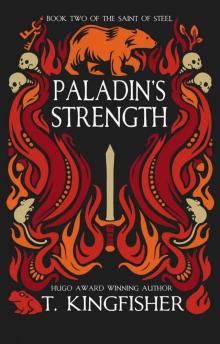 Paladin's Strength
Paladin's Strength The Twisted Ones
The Twisted Ones The Hollow Places
The Hollow Places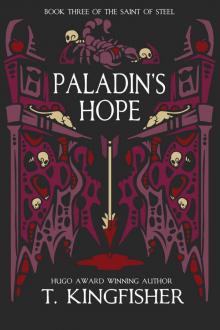 Paladin’s Hope: Book Three of the Saint of Steel
Paladin’s Hope: Book Three of the Saint of Steel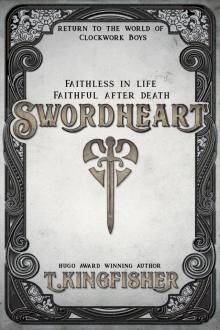 Swordheart
Swordheart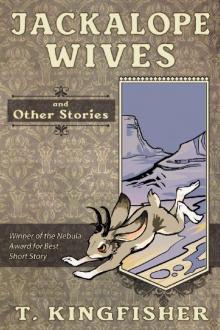 Jackalope Wives And Other Stories
Jackalope Wives And Other Stories A Wizard's Guide to Defensive Baking
A Wizard's Guide to Defensive Baking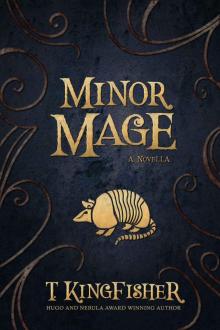 Minor Mage
Minor Mage The Halcyon Fairy Book
The Halcyon Fairy Book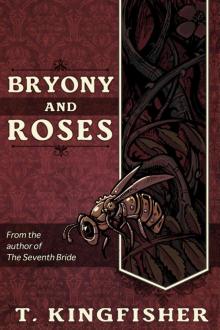 Bryony and Roses
Bryony and Roses The Wonder Engine_Book Two of the Clocktaur War
The Wonder Engine_Book Two of the Clocktaur War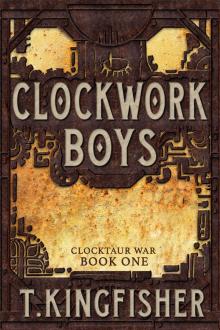 Clockwork Boys: Book One of the Clocktaur War
Clockwork Boys: Book One of the Clocktaur War The Raven and the Reindeer
The Raven and the Reindeer Summer in Orcus
Summer in Orcus The Wonder Engine
The Wonder Engine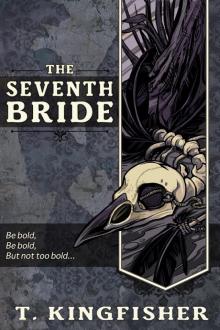 Seventh Bride
Seventh Bride Toad Words
Toad Words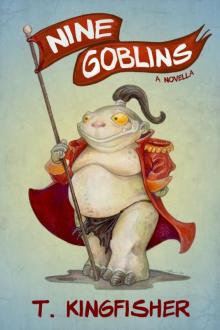 Nine Goblins
Nine Goblins